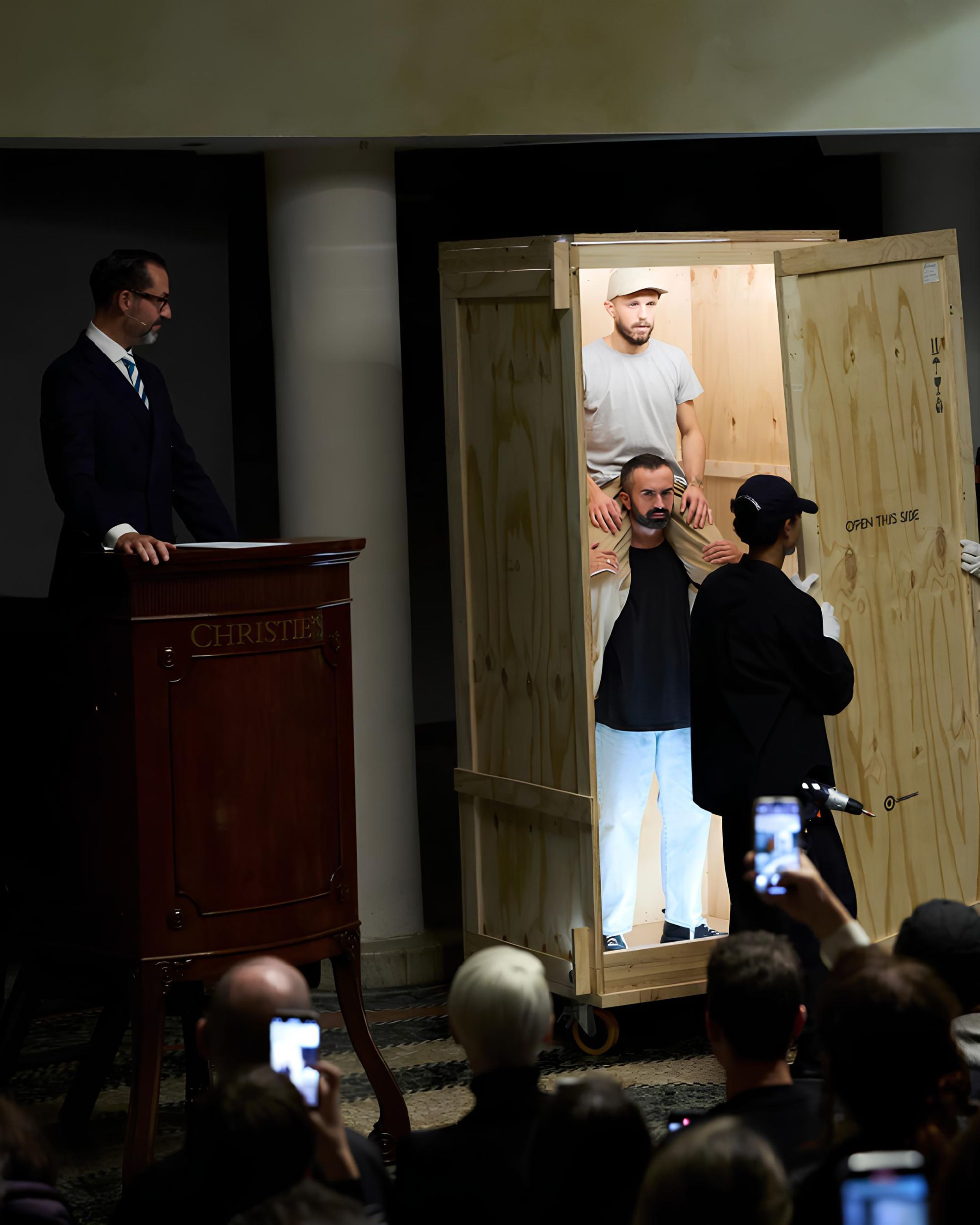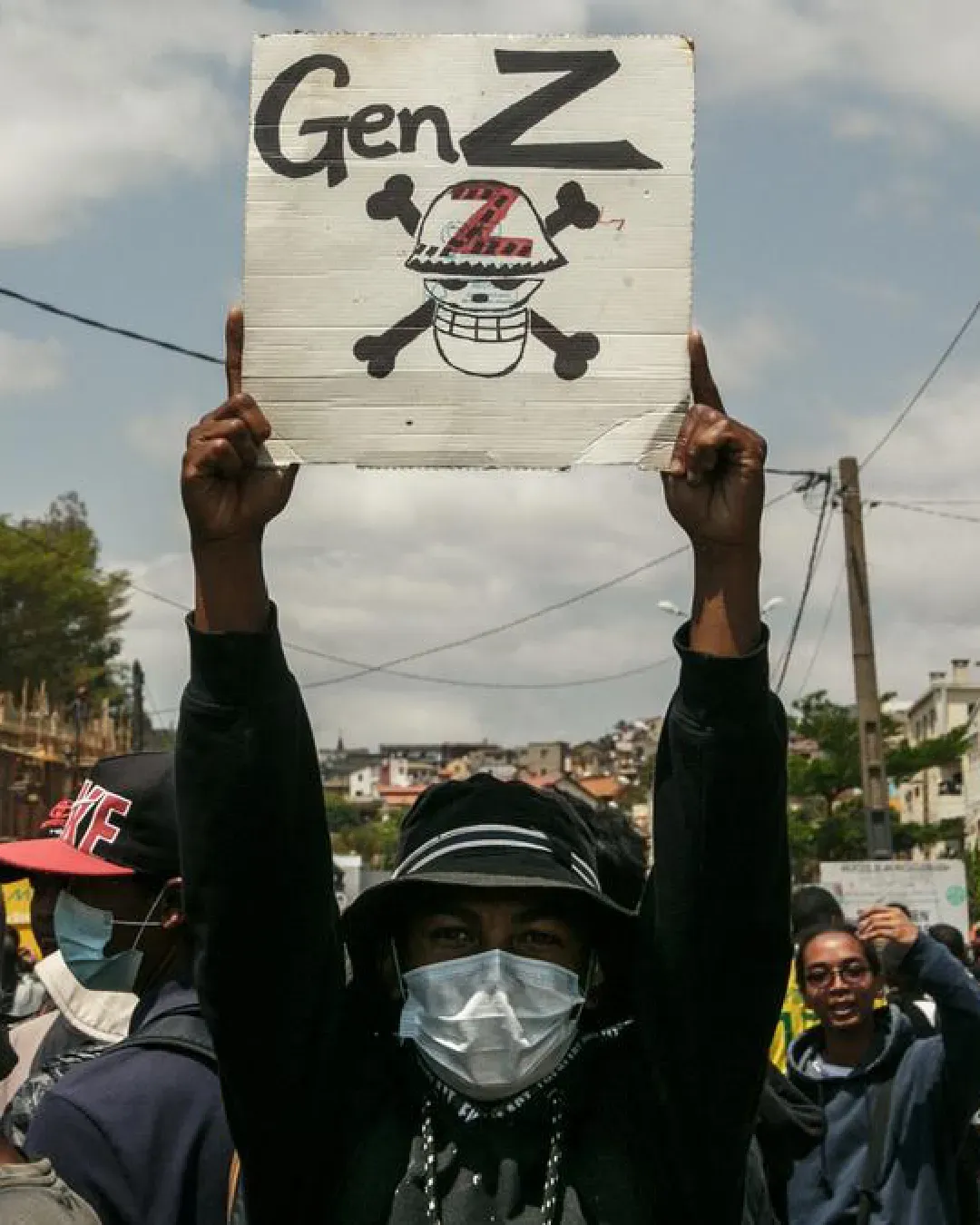
Are we really ready for a political fashion? Sincerity and hypocrisy in the post-truth era
Last night, GmbH and its founders and creative directors, Benjamin Huseby and Serhat Isik, closed Paris Fashion Week on a serious note. In complete opposition to the usual fashion policy summed up in the directive "nod and smile," the two opened their show with a political message, expressing their support for Palestine, calling for a ceasefire and the release of hostages. The show that followed this ten-minute speech was concise but perhaps among the most intense and heartfelt ever organized by the brand, with a departure from the classic queer sensuality staged by the designers in favor of garments decorated with political significance: the most notable were certainly the keffiyeh jackets, embroideries executed by refugees in the Jordanian camps, drapes over the shoulders reminiscent of prayer shawls, and the symbol of the United Nations on sweatshirts. The collection was titled Untitled Nations and aimed to be a protest against the concept of nationalism – the resurgence of which, worldwide, may represent society's first response to the spread of multiculturalist ideals advocated by Millennials like the two creative directors in recent years. The tone of the show worried some: according to Joelle Diderich of WWD, for example, who described the show as "a harrowing experience illustrating the power and responsibility of using fashion as a political platform," a certain bomber with multiple pockets resembled the explosive belt of a suicide bomber, and the murmurs of the models on the runway went against "the stereotyping and demonization of Muslims" normally promoted by the brand. The feeling did not find much echo on social media, where instead the show was appreciated, also thanks to the broad support for the Palestinian cause within the fashion industry. But regardless of where one stands on the political spectrum, one must still admit this: it's refreshing to see fashion creatives take a stance on a controversial issue.
In recent years, especially since the lockdown and the rise of the Black Lives Matter and Me Too movements, many fashion brands have noticed that affiliation with certain political causes could improve their perception and even their sales. Needless to give examples: fashion has discovered in the promotion of liberal causes a new channel of expression, charity, promotion, and sales. However, no brand, almost without exception, has ever embraced truly "hot" and controversial causes. From a social perspective, it is clear that racism, gender disparity, pollution, transphobia, and intolerance of queer minorities are negative things: it is very easy, and in some ways almost taken for granted, to be in favor of a tolerant and liberal society, promoting environmentalism and universal love. It is no coincidence that, despite what is believed, these political views have remained unchanged since the '60s, and supporting them only means promoting a generic and intuitive common sense.
the keffiyeh jackets at Gmbh tonight pic.twitter.com/LXQuEL7i27
— LOUIS PISANO (@LouisPisano) January 21, 2024
Even a political moment like Balenciaga's show in the snow, commemorating the tragedies of the war in Ukraine, did not represent a huge imbalance or a political stance: even in that situation, the division between good and bad was very clear, and therefore taking sides was not a real risk – even when viewed with the cynicism of those who see every gesture of fashion brands as merely a disguised promotion. Speaking in Paris, and especially in a "celebration of privilege" like the fashion week, about the difficult Palestinian cause that involves the conscience of every European citizen, bringing personal positions on incendiary topics such as immigration, religious tolerance, the myriad contradictions of multiculturalism, historical judgments and prejudices, whether biased or not; but also humanitarian demands, contemporary dynamics of political debate. Regardless of one's stance, it had been a long time since fashion, artistically understood, delved into such a lively, current, and divisive issue: so it's not just about quiet luxury.
@dazed @Dilara Findikoglu runway cameo at the @GmbH AW24 Men’s show in Paris #DazedFashionTV #TikTokFashion #GMBH #PFW #DilaraFindikoglu #runway #ParisFashionWeek You Look Lonely - Experiment - Undoing & 空の & The voice of the Void
However, this may not have much follow-up. Speaking of political turmoil in the United States, where the next elections will repeat a Biden vs. Trump showdown, and where political division has perhaps reached a new peak, an article by BoF says that "the reaction of conservatives and signs of public fatigue toward this type of message have increased the risk of engaging in issues like inclusivity, climate change, and LGBTQ rights. A funny T-shirt is less likely to score points with young fashion enthusiasts and more likely to trigger unfavorable coverage on Fox News and a boycott." Remember that, this summer, the choice of Bud Light to be sponsored by transgender woman Dylan Mulvaney has caused such a backlash from the brand's customer base as to almost ruin it, and something similar is happening with Disney in cinema and even in fashion: more and more companies are secretly paying attention to the warning "go woke, go broke" and trying not to anger either young activists who could stir up a social media storm or old conservatives who have the spending power to fuel sales.
In short, both the public has grown tired of fashion's hypocrisy, recognizing all its empty sycophancy; and the risks of being boycotted, opposed, or targeted by a certain political faction seem increasingly disproportionate, considering how the rise in credibility of some (even extremist) factions has made it publicly acceptable to declare support for regressive or authoritarian political ideologies, as in the case of tradwives or Andrew Tate, now almost a guru for teenagers; but also the return of authoritarian political ideologies. The prediction, therefore, is that the fashion industry will prefer not to get involved, or at least stay on battlefields that are easy to win to safeguard sales. But at this point, what will happen to those brands that had concealed the poverty of their creative ideas with political virtues? The desire to play it safe and the lack of real creative risks should inaugurate a 2024 made of reassuring fashion and very alarming news coming from all over the world. In this sense, regardless of one's stance, the choice of Benjamin Huseby and Serhat Isik demonstrates that the two have courage – and that's enough for us to respect their human stature and intellectual depth.















































